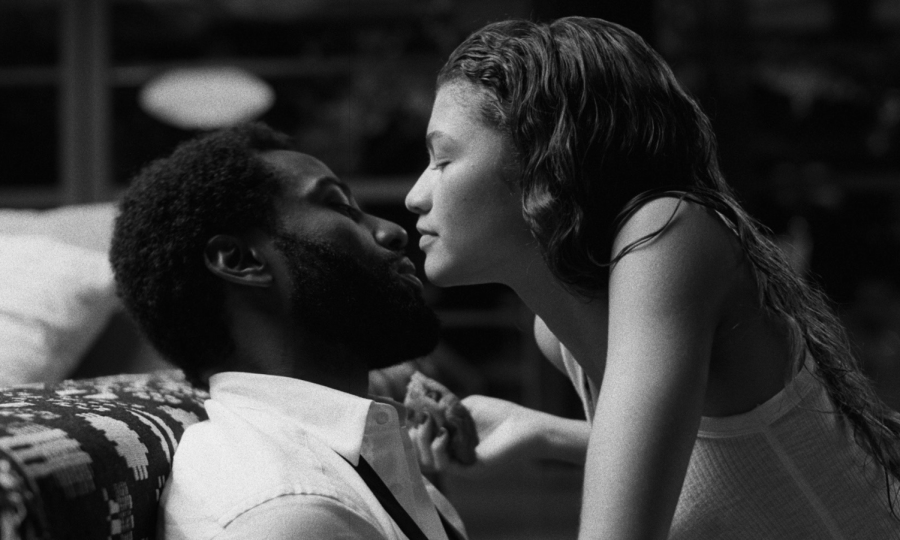Digging For Meaning in “Malcolm & Marie”
February 22, 2021
“Malcolm & Marie,” released on February 5 as a Netflix original film, has created polarizing reactions. Directed and written by Sam Levinson, also known for the HBO series Euphoria, the movie features just the two titular characters: Malcolm (John David Washington) and Marie (Zendaya). Malcolm is a filmmaker who is on the brink of Hollywood glory after the premiere of his movie, and Marie is his girlfriend, a former actress who supported Malcolm throughout the series of the production. All of the scenes take place within just a few hours, as the couple finds themselves hurtling towards a reckoning through a tumultuous night of fighting and making up.
Malcolm & Marie was shot entirely during the lockdown, with a crew of only 22 people over 14 days. The movie was also self-financed and produced by the leading actors, which is a first for both. Zendaya, although in the spotlight since her early days as a Disney star, has never taken a creative initiative in a project. Her ability to take on such a project was questioned by many who can’t imagine the 24-year-old as an adult quite yet, after playing a teenager on screen for almost a decade. Her previous collaboration with Levinson, as the star of “Euphoria,” inspired him to write Marie with her in mind, and it’s no doubt her most mature role yet. Washington, on the other hand, is a whopping 12 years older than his costar and has recently blown up through his roles in critically acclaimed films such as “BlacKkKlansman” and “Tenet.”
One of the most obviously distinct creative choices is that the movie is shot entirely in black-and-white with stunningly precise and clever cinematography, often using mirrors and windows to follow the action, mastering the intimacy of each character reflecting the emotions of their partner while also allowing the subjectivity of a viewer.
The movie is also just a long series of ongoing dialogue, with everything from violent screaming matches to proclamations of love and admiration. The acting from both Washington and Zendaya is absolutely phenomenal, and it makes it difficult for any one person to seem at fault. But the moving performances are always shortly overcome by long diatribes where one tears down the other, in a painfully long and sometimes repetitive pattern of attempting to explore the ever-thinning line between hatred and passion. Many of the monologues given by the actors seem alarmingly self-referential, in such a way that audiences can do nothing but question if Levinson took this opportunity as none other than to air out his own personal grievances as a filmmaker. One of the most prominent performances by Washington is his rant about the idiocracies of modern-day film critiques, after reading an LA Times review about his movie. Malcolm gripes about having his movie analyzed for possible political messages, meanwhile, Levinson’s film is abundantly clear with its purpose. While I can’t say there is an inherent flaw with any movie displaying its message quite so blatantly, it can be easily said that what Levinson lacks is an actual narrative. While the bare-bones nature of the film is what gives audiences the wonderful feeling of overwhelming intrusion during scenes that often no longer felt like acting, it also gave the script what I can only assume Levinson felt was an excuse to have his characters literally scream what he wanted to say.
Ironically, the dialogue in “Malcolm & Marie” feels the most powerful when the couple is whispering. When the dust is finally allowed to settle, and both Washington and Zendaya are given the chance to explore the vulnerabilities in the quiet moments in between, I felt, for the first time, that the characters had more to offer than just their anger, that they had voices that were more than just loud.
The best scene in the film, in my opinion, occurs about halfway through the plot. After yet another fervent disagreement, Marie gets in the bath as Malcolm sits across from it. The beginning of the pair’s conflict was Marie’s disappointment when Malcolm fails to thank her in his speech, especially when she believed the story of his movie was largely based on her life. He comes to solemnly apologize and explain the many ways in which his movie’s character is actually an amalgamation of everyone he’s ever loved. He explains that he loves her, even if he doesn’t need her, and cuts her with words that are barely heard. This scene is the shining star of the film, and everything from the single tear rolling down Washington’s cheek to Zendaya’s quivering lip and smudged makeup feels more impactful than any other overdone attempt to belittle one another.
Overall, “Malcolm & Marie” was certainly unique and the writing was incredibly intelligent, if not pretentiously so. Neither the acting nor the cinematography can be faulted, but something about the film still seems to fall flat. Whether it was the up-and-down nature of a neverending rollercoaster that I was ready to get off, the general sense of preachiness from Levinson’s mouthpieces or the character arcs that seemed more like loops, with the same issues brought up and resolved tenfold within one night, I can’t imagine going back to see this film again. With all that being said, this movie is nothing if not worth watching a first time, and a fantastic example of how clever movies can continue being made with today’s restrictions, with a capable cast and crew and one incredibly intimate idea.


